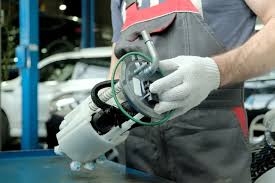BMW fuel pump failure is a concerning issue for every BMW owner. A fuel pump is vital for your car’s performance, and understanding its failures is crucial for maintaining your vehicle’s health. In this article, we explore the common causes behind fuel pump issues and provide practical solutions. Whether you’re facing a current problem or looking to prevent future troubles, this guide is your go-to resource for all things related to BMW fuel pump failures.
Functions of BMW Fuel Pump
The fuel pump in a BMW plays a pivotal role in the car maintenance and performance. It ensures a steady flow of fuel to the engine, maintaining optimal engine efficiency and power. This component is essential for the smooth operation of the engine, directly impacting acceleration and overall driving experience. A well-functioning fuel pump is key to the engine’s reliability and the vehicle’s performance on the road.
Symptoms of BMW Fuel Pump Failure
- Engine sputtering at high speeds.
- Decreased fuel efficiency.
- Loss of power when the vehicle is under stress.
- Car surging unexpectedly.
- Engine refuses to start.
- Decreased power when accelerating.
- Engine stalling at high temperatures.
- Whining noise from the fuel tank.
- Difficulty starting the engine.
- Idling at a higher-than-normal speed.
Causes of BMW Fuel Pump Malfunction
A BMW fuel pump malfunction can stem from various factors, each affecting the vehicle in unique ways. From electrical issues to regular wear and tear, understanding these causes is crucial for maintaining your BMW’s performance. Identifying the root cause early can save time and prevent more severe damage to your vehicle. Here are common causes of BMW fuel pump failure.

Electrical Issues
Electrical problems are a frequent cause of BMW fuel pump failure. Issues like faulty wiring or malfunctioning relays disrupt the power supply, hindering the pump’s operation. Regular checks of the electrical system can prevent these disruptions, ensuring the fuel pump functions correctly. Addressing electrical faults early is key to maintaining your BMW’s fuel efficiency and engine performance.
Contaminated Fuel
Contaminated fuel is another common culprit behind BMW fuel pump malfunctions. Dirt, debris, or water in the fuel can damage the pump and affect its efficiency. This contamination can lead to clogs and increased wear on the pump. Using high-quality fuel and changing the fuel filter as recommended are essential steps in preventing fuel contamination in your BMW X5 Repair.
Wear and Tear in the Fuel Pump
Over time, wear and tear is a natural cause of fuel pump deterioration in BMWs. Continuous use leads to the gradual breakdown of the pump’s components, affecting its ability to deliver fuel efficiently. Regular maintenance and timely replacement can help mitigate the effects of wear and tear, ensuring the longevity of your BMW’s fuel pump.
Fuel Pressure Problems
Fuel pressure problems significantly impact the performance of BMW fuel pumps. Inadequate pressure can strain the pump, leading to inefficient fuel delivery and engine issues. Regular checks of the fuel pressure can prevent these problems, maintaining the optimal performance of your BMW’s engine.
BMW Engine Overheating
Engine overheating in BMWs can also lead to fuel pump malfunctions. High engine temperatures can affect the fuel pump’s operation, compromising its efficiency. Ensuring your BMW’s cooling system is functioning properly can help prevent overheating, thus protecting the fuel pump from heat-related damage.
How to Fix The BMW Fuel Pump?
Addressing issues with your BMW fuel pump in a timely manner is crucial for the health and performance of your vehicle. Ignoring signs of fuel pump malfunction can lead to more significant problems, potentially affecting other aspects of your BMW’s engine. Early detection and swift action are key to ensuring your BMW runs smoothly and efficiently. It’s not just about fixing a part; it’s about maintaining the integrity of your entire vehicle.
At our specialized BMW workshop Dubai, we understand the intricacies of BMW fuel pumps. Our team of BMW experts is equipped to diagnose and advise the best course of action, whether it involves BMW fuel pump repair or a complete BMW fuel pump replacement. We believe in providing tailored solutions that cater specifically to the needs of your BMW. Our goal is to ensure your BMW operates at its best, with a fuel pump that’s as reliable as the day you first drove it.
Maintenance Tips to Prevent BMW Fuel Pump Failures
Regular maintenance is essential to prevent BMW fuel pump failures and ensure the longevity of your vehicle. Proper care can significantly reduce the risk of fuel pump issues, saving you time and money in the long run. Here are ten practical tips to help maintain the health of your BMW’s fuel pump:
- Regularly check the fuel level; avoid running your BMW on a near-empty tank.
- Use high-quality fuel to prevent contamination and clogs.
- Replace the fuel filter as recommended in your BMW’s maintenance schedule.
- Schedule routine electrical system checks to prevent electrical faults.
- Keep an eye on the fuel pressure and have it inspected regularly.
- Regularly inspect and maintain your BMW’s cooling system to prevent overheating.
- Avoid abrupt changes in driving habits that can strain the fuel pump.
- Listen for unusual noises from the fuel tank area, indicating potential pump issues.
- Have your BMW serviced at intervals specified in the owner’s manual.
- Consult with BMW specialists for regular diagnostics and professional advice.
Bottom Line
To sum up, tackling BMW fuel pump failures effectively hinges on a blend of awareness, proactive maintenance, and skilled intervention. A timely BMW fuel pump repair can make all the difference. In cases where expert input is required, our Auto garage stands ready to offer specialized advice and solutions, be it for repair or replacement. By staying informed and entrusting your BMW to knowledgeable professionals, you ensure that your car remains not just a mode of transport, but a symbol of reliability and excellence on the road.




